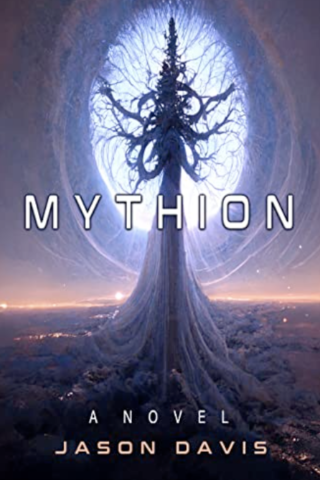
Description:
The garden on Haven Ridge is the last bastion of green and growing things in a world turned to dust. One day, an army of a thousand men marches out of the desert and lays claim to the garden, capturing the few people who live there. It falls to a young woman named Adhi to find the heart of the garden, where a magic exists that might save it. But these men are servants of Deti Maranam, Lord beneath the Sand, and they bring a dangerous and deadly magic of their own. A brutal fight for survival will determine the fate of the garden and of the whole world.
Rating: PG Parental Guidance

Jeffrey Aaron Miller
e x c e r p t
Garden of Dust and Thorns
by
Jeffrey Aaron Miller
Chapter 1: The Shapes of Men
The shapes of men materialized out of the dust clouds, bodies wreathed in loose cloth of black and gray. Hoods and veils hid their faces, but they moved with purpose, marching in ranks. Though the distance was great, Adhi saw the glint of polished blades, of long silver spears and curved scimitars, catching the heavy rays of the lowering sun as it sank below the ridge in the west. She counted over three dozen men, but there were more of them behind the wall of dust. She saw a hint of movement, as of dozens more, gathering in the open land between the dunes.
“I’ve never seen so many pilgrims all at once,” Kathiri said, poised on the edge of the low wall. “Maybe they’re not pilgrims. Maybe they’ve come to kill us. What do you think, little sister?”
“I don’t know,” Adhi replied. He had said it so casually, as if there were little difference either way, but Adhi shuddered. “They look like monsters to me, like they crawled up out of the sand. Maybe that’s why they hide their faces, so we can’t see what they really are.”
“No, their faces are covered because of the sandstorms. These are ordinary men.” Kathiri was balanced on the balls of his feet, leaning out over the wall, though it was a fifty foot drop to the bottom of the ridge. He looked left and right. “There are no watchmen on this side. That means we are the first to see them. Which Appan should we bring the news to? It will favor his house in the council meeting to present the report. Appan Gendu? He has been more generous to our family than the others.”
The dust had begun to settle, and the true magnitude of the approaching force became clear. Not dozens but hundreds, stretching back into the dunes to the horizon. Teams of horses pulled great wagons, but most of the men were on foot, the closest of them no more than a quarter of a mile from the ridge.
“Pick your favorite Appan,” Kathiri said. “Come on. If not Gendu, then maybe Soti. What do you think? Appan Soti has many strong sons. If you found favor with him— ”
“I don’t care about politics,” Adhi said, cutting him off. “Tell whichever Appan you want to tell. It doesn’t mean anything to me, and I don’t care about Soti’s strong sons. I’m going to the hut to warn the caretakers.”
“What are the caretakers going to do?” Kathiri said. “Pluck apples for the pilgrims?”
“Well, they need to know if hundreds of men are about to enter the Garden, don’t they?”
Kathiri rose up tall, smoothed out the fine fabric of his robe and stepped down from the wall onto the soft dirt of the Outer Path. “This situation will be handled by the Appani, by wise men, and I need you to come with me to back up my story.”
“If you weren’t such a liar, you wouldn’t need me to back up your story,” Adhi said. “People would believe you.” She gave the strange men one last long look, and fear rose in her like cold water seeping through her body. They were a vast black shadow across the desert, a nightmare image, and everywhere, blades glinted in the sunlight.
“I might be a liar, but you are an insufferable brat,” Kathiri said. “Watch your mouth when you speak to me. I’m responsible for your future. Remember that. And I don’t lie. I tell people, powerful people, what they want to hear to win favor for our family. There’s a difference.”
He reached out and snagged her wrist, pulling her away from the wall and dragging her along behind him as he started for the city. His loose robe was more suitable for fast walking than her many-layered dress, so she struggled to keep up.
“Let go of me,” she said. “I won’t be pulled around like a child. I’m not a child. I’m nineteen, and I’m going to the caretakers’ hut.”
“You can go to your precious caretakers after I’ve made my report,” Kathiri said. “The caretakers will still be there, sitting on their cushions, picking fleas and watching flowers grow.”
The Outer Path followed the wall for a good hundred yards before turning west and winding its way up a low rise to the watchmen’s house. A small, weathered building of red brick, it was the oldest place in Haven Ridge, the oldest place built by people. Beyond it, the city lay in neat rows, forty buildings of red brick and brown stone, nestled before the immense green wall of the Garden. Many people were outside, despite the waning light, working at their various tasks, oblivious to the long shadows moving below the ridge.
As they passed the watchmen’s house, Adhi’s slippered right foot stepped into a hole, and she went down. Kathiri had to loose his hold on her wrist to keep from falling with her. As she picked herself up and brushed the dirt off her dress, he snapped his fingers at her.
“Come, come,” he said. “Quickly, before someone else sees them and makes the report.”
He reached for her wrist again, but she lurched to one side and avoided him.
“I can walk on my own,” she said. “Don’t touch me.”
“Very well,” Kathiri replied. “See that you don’t veer off toward that big, green wall. I don’t want to have to chase you through the thorns and vines, but I will.”
She waved him on, then gave him a dirty look as soon as his back was turned. Kathiri, like most of the residents of Haven Ridge, had respect for the Garden, but he did not love it as Adhi did. He did not long to spend his days in the cool shade beneath the leaves. He did not relish the company of the caretakers, nor wander in silence among the sturdy trees, listening for the whispering voice of the Old Planter. No, like most people, he viewed Adhi’s devotion as foolish and a waste of time. On the other hand, she found his obsession with Appani politics, trying to curry favor with wealthy families, pointless and puerile. What did it matter if he had the support of some fat old men? What difference did it make?
Kathiri led her through the streets, dodging scampering children and women carrying large wicker baskets, until he came to the sprawling house of Appan Gendu. Three stories of heavy brown stone, it was one of the largest buildings in town. An entry gate led into a small courtyard, where they found the Appan seated on a cushioned bench, watching one of his daughters grind chickpeas in a basin. Appan Gendu was enormous, his fine white robe large enough to cover three or four average-sized men. He had a thick, wooly beard and a head of long white hair, and a bronze platter of pears and figs rested on his stomach.
“What’s this?” he said, as Kathiri stepped into the courtyard. “What are you doing barging into my house, son of Niroti?”
Kathiri came to a stop and bowed low, signaling with a flick of his hand for Adhi to do the same. She spread her hands wide and offered the traditional genuflection, and Gendu grunted.
“Men in the desert,” Kathiri said. “Men with weapons, all draped in black and gray. We saw them, both of us.” He gestured at Adhi.
“Is that your story now?” Appan Gendu said. He plucked up a ripe fig and bounced it in the palm of his hand. “Men in the desert?”
His daughter paused in her work and glanced at Adhi, wide-eyed, but Appan Gendu waggled his hand at her, and she returned to her work.
“It’s not a story, sir,” Kathiri said. “Many and many, we saw them.”
Appan Gendu pointed at Adhi. “Your brother sometimes sees things that ordinary men do not. What about you, girl? What did you see?”
Adhi cleared her throat. “Just as he said, Appan. A mass of armed men marching toward the ridge.”
“And what were the two of you doing on the Outer Path?” Appan Gendu asked.
“Walking, sir,” Kathiri said. “Enjoying the warm afternoon sun. Nothing more.”
The lie came easy to Kathiri, as lies often did. The Outer Path had afforded a modicum of privacy, so that Kathiri could discuss his coming inheritance and his plans for Adhi. Father was ill, and already Adhi’s brother was planning his political maneuvers. An arranged marriage for his sister would play an important role in creating, or recreating, loyalties. He had only to determine which family’s loyalty would be most beneficial. Adhi was disgusted by it, but she couldn’t blame him. Decisions would have to be made and quickly. Father had lost favor with key Appani as his health had declined. All of these things would become Kathiri’s responsibility the moment Father passed away—if he passed away, she reminded herself, If. Mother still hoped for a miraculous recovery.
“And how many men did you see, girl?” Appan Gendu asked. He brought the fig to his mouth, as if he meant to take a bite. Then he seemed to reconsider and set it down on the platter.
“Hundreds,” Adhi said. “Stretching out to the horizon.”
And, as if to prove her point, at that moment, the horn of a watchman sounded. A single piercing note rising up and up, breaking the quiet of early evening. Appan Gendu started and nearly slid right off his bench. In the process, he dropped the platter. It clattered against the tiles, and pears and figs bounced in all directions. His daughter dropped her grinding stone and went to his side, but he waved her off. She stooped to pick up the fruit instead.
Appan Gendu stood up, groaning with the effort, and waddled toward the gate. Kathiri beckoned his sister and went after him.
“I reported it first,” Kathiri said. “Don’t forget, sir. Before the watchman’s horn, I reported it to you.”
“So what if you did?” Appan Gendu said. “Do you want a pat on the head?”
“No, sir,” Kathiri replied, grimacing.
Kathiri tried to get past him, but the Appan was so wide, he blocked the short hallway leading to the gate. The horn finally died, and Adhi heard a commotion in the street—raised voices, slamming doors. She followed Kathiri and Gendu through the gate and saw a gathering of men, Appani and their sons, at one of the intersections. A watchman in his green vest stood before them, gesticulating wildly as he spoke. Kathiri finally got around Appan Gendu, seized Adhi’s hand and drew her toward the crowd. Though most of the women held back, moving protectively toward homes and children, Kathiri brought Adhi right up to the men. She slunk back behind her brother.
“As numerous as grains of sand,” the watchman was saying. “More men than all of the people in Haven Ridge combined.”
“Did they bear any kind of sigil or sign or flag?” Appan Soti asked. A tall, bent-backed old man, Soti stood among his many sons, leaning heavily on a staff.
“None that I saw,” the watchman replied. “But they moved like an army, formed in ranks, the vanguard on foot, the horses and wagons coming behind.”
Appan Gendu used his considerable bulk to force his way into the crowd, pushing aside any who resisted with hip and thigh and forearm.
“The sun is setting,” he said. “Surely, if they have traveled far, as they must have, they will stop to camp for the night. That gives us time to meet and make plans.”
“No, sir,” the watchman replied, with an apologetic bow. “They show no signs of stopping. They march without slowing toward the ridge on the east side. They will arrive at the bottom of the Outer Path by nightfall.”
Appan Gendu turned to regard the much taller Appan Soti.
“Surely they won’t attempt the ascent in the dark,” Gendu said. “It would be treacherous for so many.”
“Hundreds of armed men marching into the city at night,” Appan Soti said. “I can’t imagine it. People will be terrified.”
“We must send messengers.” One of the sons of Soti, a strong and handsome young man named Omaan, stepped in front of his father as he spoke. “We must discover their purpose, we must hear it with our own ears. Send me, Father. I am not afraid.”
“Then you are a fool,” Appan Soti replied. “We know their purpose. People only come to Haven Ridge for one reason.”
“Pilgrims come to behold the Garden, yes,” Omaan said. “To honor the Old Planter. But pilgrims come by the dozens, not the hundreds.”
“They do not come to honor the Old Planter,” Appan Soti said. “But they do come for the Garden. Mark my words.”
Come for the Garden? Hundreds of armed men come for the Garden? Adhi didn’t even know what that meant, but her heart raced. What would an army want with the Garden? To take it by force? To violate it in some way? She couldn’t imagine, but suddenly she needed very much to be there. She needed the safety of the roof of branches, the feel of grass beneath her bare feet and the comfort of a cool breeze on her face.
“Perhaps we can make peace them,” Appan Gendu said. “Surely there is something we can offer to appease these men. There is plenty of food to spare, even for so many, though it will take much work to gather it.”
“We must send messengers,” Omaan said again. “Find out what they intend before they march into our streets. Father, you know I’m right.”
Adhi twisted free of her brother’s grasp and turned toward the Garden wall.
“Where are you going?” Kathiri said, reaching for her. “Now is not the time to run off by yourself.”
“The caretakers must be informed,” she replied, dodging his grasping hand.
She turned toward the distant wall and hurried away from the gathered men. Kathiri started after her—she heard three footsteps—before cursing softly and giving up. Adhi ran through the city streets, past children being shuffled into courtyards by mothers and grandmothers, past horses and donkeys tied to posts, past looms and grinding wheels and workbenches recently abandoned, past her own home. Her mother stood in an upper floor window, leaning out over the street. She would not leave Father’s side, not even with the watchman’s horn blowing.
“Adhi, what’s happening?” she called down.
Adhi slowed but did not stop, pointing eastward. “Men approaching the ridge,” she said. “A whole army. They’ll be here by nightfall. I have to warn the caretakers.”
“An army,” her mother cried. “Why? Why now? Adhi, where is your brother?”
But Adhi was already rounding the corner and did not respond. Beyond her house was a clearing, forty yards wide, that separated the city from the Garden wall. Here dust and dirt gave way to sparse grass and weeds, and here a few sheep and goats grazed, watched over by shepherd girls in simple linen dresses. One of the shepherds saw Adhi coming and moved to intercept her. A lowly daughter of a lowly family, Evirsi was scrawny and plain-looking, but Adhi thought well of her. They often chatted when Adhi was on her way to the Garden.
“I heard a horn blowing,” Evirsi said, gesturing toward the city with her shepherd’s crook. “Did someone die?”
“Not yet,” Adhi replied. “You should go to your family.”
“My father has not released us from duty yet,” Evirsi said. “Another hour perhaps, and it will be time to pen the animals, but not until—”
“You should go now,” Adhi said. “You father will understand. You should be with your family. Take the animals to their pens. Hurry!”
“But Adhi…”
She trailed off as Adhi hurried past her, weaving in and out of the sheep and goats. Other shepherds had turned to watch her, and Adhi could only hope that Evirsi would speak to them. Ahead, the great Garden wall rose forty feet into the air. The Old Planter had made it, or so the caretakers said, a wall formed of many thousands of thorny vines woven together. Ivy covered the front face of the wall, but behind the ivy, Adhi knew, were six or seven feet of age-hardened vines, thorns as long as a man’s forefinger and sharp as a spear tip.
No path led to the wall, only open ground, and the ivy so thoroughly coated the eastern face that the entrance was not visible. But Adhi knew where it was. She had been there many times. Just north of the herd, beyond the wooden pens where the animals spent the night, a small rock, scarcely noticeable in the grass, pointed the way. Shaped like a leaf, but only crudely so, the stem aimed toward the opening.
Adhi hopped the rock and stooped down, sweeping aside the thick curtain of ivy and forcing her way through a narrow gap in the wall. A triangular tunnel through the layers of woven vines led from the clearing into the deep shadowy coolness of the Garden itself. She slipped out of the end of the tunnel, careful to avoid the thorns that hung down over the end like teeth, and sat down on the low-lying branch of a tree to catch her breath. She had been in the Garden hundreds of times, but always she had to stop in her tracks and adjust. Lush green on all sides, leaves overhead, flowering plants beside her, soft grass at her feet.
The Garden was like no other place in the world, or so she had been told, a unique gift from the Old Planter, seven hundred years old and as beautiful as ever. Trees of every variety grew side by side, gnarled oak trees beside stately elm, massive maple trees nestled against palm trees and majestic aspen, leaves of every shape and size, needles and cones, flowers of every color and every kind of fruit. Here the people of Haven gathered up pears and apples, figs and dates and bananas, oranges and lemons and pomegranates, all that they could ever need and more. And besides trees, there were bushes with blackberries, raspberries and berries that no one had a name for, as well as grains and roots and tubers and beans. Birds sang from the tree branches, squirrels and chipmunks scampered about, and butterflies flitted from petal to petal.
How any man or woman could go a day without longing for this place, Adhi did not know, yet that was the way of it. Many in Haven Ridge had never stepped foot in the Garden. Servants were sent to gather food. The closest some came was during holy days when the caretakers summoned the people to the clearing outside the wall to honor the Old Planter.
Here the air was always cool, the shadows deep. Sunlight danced through the swaying branches. Adhi closed her eyes and breathed in the scent of fruit and flower. She would have remained there longer—sometimes she spent hours seated on that same low-lying branch—but waning sunlight roused her. She removed her slippers, set them in the grass beside the tunnel mouth and started into the Garden.
The soil was a dark, rich brown, and unlike the sparse, weedy grass in the clearing, here the grass grew soft as feathers. A narrow path led from the tunnel and wall into the forest. It was not a cleared path, for the caretakers would never have considered taking scythe to any of these plants, but rather, it was the result of many years of walking, a worn and winding trail. It curved around a stand of massive red maple trees, their thick branches twisted in all directions, then turned back the other way and moved through a mass of towering palm trees. A coconut had freshly fallen on the path. Adhi stooped to pick it up, intending to cast it aside, but instead she carried it with her as she walked, clutching it as if it might suddenly, as if everything might suddenly, disappear.
Another turn brought her in sight of the caretakers’ hut, a small stone building beside a burbling creek. The Garden had mostly absorbed the building, wrapping it in vines and limbs and leaves and casting flowers over its rooftop. Only the front wall remained visible, a simple door of hammered bronze, a single window covered in linen curtains of many colors. A large barrel for collecting rainwater sat beside the door, and here one of the caretakers was busily washing her face and hands as Adhi approached.
The caretaker dabbed the water from her face with her sleeve and rose at the sound of Adhi’s soft footfalls. She was an old woman, wrinkled and small, long hair draped down her back. Pathi was her name, oldest of the caretakers and oldest person on the ridge.
“Why, Adhi, you look like you’ve seen a ghost,” the old woman said. “You bring a gift? We already have many and more than we need of coconuts.”
Adhi laughed out of embarrassment and dropped the coconut at her feet. She saw figures moving behind the curtains, shadows cast in lamplight. Seven caretakers lived in the hut, four men and three women. The women lived upstairs, the men below, never marrying, their whole lives devoted to honoring the Garden and the Old Planter, teaching the people of Haven Ridge and keeping the traditions alive.
“You didn’t hear it?” Adhi asked. “You didn’t hear the horn blowing?”
Pathi shook her head. “We don’t hear from the city on this side of the wall. Have the Appani called a meeting?”
“Pathi, ma’am, can I speak to everyone? Please, it’s…it’s very bad.”
Pathi regarded her for a moment, one eyebrow raised. Then she nodded, pulled a handkerchief out of the hip pocket of her simple caretaker’s robe and dried her hands. She shuffled toward the door of the hut, pulled the peg latch and waved Adhi inside.
“They are all inside,” she said. “Preparing for supper. But it’s late, girl. Speak quickly, so you can return home before dark.”
Adhi moved toward the hut, but she tripped on the discarded coconut and went sprawling. Damp earth, saturated by the nearby creek, squished between her fingers. She picked herself up, noted the fresh mud stains all down the front of her dress and sighed. It would be hers to clean anyway. Mother spent all of her time watching after Father, and Kathiri was busy politicking. That left Adhi to do most of the menial work around the house.
She kicked the coconut aside, blushing furiously as old Pathi chuckled, and hurried inside the hut. Just beyond the door was a sitting room. Cushions lined the walls, and a low table sat upon a dusty green rug. A short, fat caretaker was carrying a very large platter piled high with fruit toward the table. Behind him, others began to enter the room. Adhi took a seat on a large cushion in the corner, sinking into the soft fabric.
The short, fat caretaker set the platter down on the table and began to arrange the fruit around its edges. Then came Diyaman, skin as dun as a walnut shell, with an enormous gray beard spilling down the front of his robe. After him, Innpan, youngest of the caretakers, an unfortunate-looking fellow with a fleshy face and big teeth. He glanced at Adhi and became instantly awkward, frowning and fidgeting and ducking his head as he approached the table.
“We have a guest for dinner?” Diyaman said, piling his beard in his lap as he sat down, cross-legged, at the table.
“No,” Pathi said. “She is here to speak briefly. Her family will be waiting for her.”
“Adhi?” Diyaman said, reaching for a date. “Speak.”
Other caretakers were entering the room, finding seats around the table, pouring drinks and picking at the fruit. Adhi cleared her throat and rose. The Garden was such a different world, so detached from the barren rocks and dirt of the ridge beyond the wall, that she lost some of the immediacy of the approaching army. Now, however, it returned with a vengeance, and she felt a sudden surge of anxiety. She propped herself against the wall and stood up to speak.
“Caretakers, an army of men is marching toward Haven Ridge,” she said. “I have seen them with my own eyes. Appan Soti believes they have come for the Garden.”
Slowly, every caretaker turned in her direction, but for a long moment, no one spoke. Finally, Diyaman dropped the date he was holding and pursed his lips.
“Are we certain they are not mere pilgrims?” he said.
“They have swords and spears and veiled faces,” Adhi said. “And there are hundreds of them. They march in formation.”
The caretakers glanced at one another as they considered her words. All seemed to have lost their appetites. Finally, Diyaman stroked his long beard and nodded.
“I will go,” he said. “The Appani will try to protect us from the truth. We must see this for ourselves.”
“No, sir, let me,” young Innpan said, pushing back from the table. “I will go.”
Diyaman shrugged. “Very well. Adhi, take the boy and show him these men. Supper will wait until he returns.”
Adhi stifled a groan, as the pudgy boy came toward her, smoothing out his robe. But she turned dutifully toward the door and led him outside.
“If they are pilgrims, tell the Appani they must camp for the night,” Diyaman said. “We will meet them at the wall at first light.”
“Yes, sir,” Innpan said. He was right at Adhi’s shoulder, brushing against her dress as he followed her out of the hut.
“And escort Adhi to her father’s house afterward,” caretaker Pathi added. “She can come back with the pilgrims in the morning, if she wishes.”
Pilgrims, indeed. Why did they keep referring to the approaching men as pilgrims? Hadn’t she already told them the men were armed and marching in formation? She was outside, but she considered turning back, if only to reaffirm her description of the men and press the point. The hovering Innpan, ever eager, kept her moving down the path. Adhi was all too aware that her constant presence in the Garden was a source of irritation to the caretakers. She wasn’t going to join their ranks. That issue had been settled by her brother, and she didn’t have much interest in being a caretaker, anyway. She didn’t relish the idea of living in that tiny hut with all of those bored-looking people. No, her love was for the Garden, for the Old Planter and for every growing thing.
“I’ll lead the way,” Innpan said, pushing past her. “Follow me, Adhi. Come quickly.”
“I know the way,” she said. “I don’t need you to lead.”
He started down the path but stumbled suddenly to a stop. Adhi’s brother, Kathiri, had come, racing around the corner, out of breath and sweating. He spotted Innpan, started to speak, then shook his head and waved the caretaker aside. Innpan inclined his head and stepped out of the way, and Kathiri approached his sister.
“They are…they are…” He paused, took a deep breath and let it out slowly. “They are ascending the Outer Path even now.”
“Tell the pilgrims to camp for the night,” Innpan said, clasping his hands before him and trying to sound official. “They can enter the Garden in the morning. We will meet them at first light at the wall. That is the decision of the—”
“The spearmen are in front,” Kathiri said. He had Adhi’s slippers in his hand—she had left them beside the low-lying branch—and he tossed them to her as he spoke. “They are chanting, Death, Death, Death. All of them in unison. I heard it, we all heard it. Come, Adhi, we must help father. He cannot flee on his own.”
He reached out to take her hand, and this time she did not resist.










